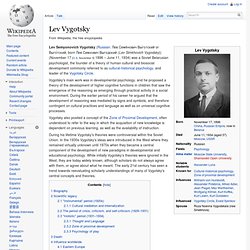

Lev Vygotsky. Lev Semyonovich Vygotsky (Russian: Лев Семёнович Вы́готский or Выго́тский, born Лев Симхович Выгодский (Lev Simkhovich Vygodsky)) (November 17 [O.S.

November 5] 1896 – June 11, 1934) was a Soviet Belarusian psychologist, the founder of a theory of human cultural and biosocial development commonly referred to as cultural-historical psychology, and leader of the Vygotsky Circle. Vygotsky's main work was in developmental psychology, and he proposed a theory of the development of higher cognitive functions in children that saw the emergence of the reasoning as emerging through practical activity in a social environment.
During the earlier period of his career he argued that the development of reasoning was mediated by signs and symbols, and therefore contingent on cultural practices and language as well as on universal cognitive processes. Vygotsky, Piaget, and Bruner. Vygotsky, Piaget, and Bruner Lev Vygotsky, Jean Piaget, and Jerome Bruner have emphasized cognitive development as being intimately linked to the brain's construction of knowledge within a social context.

Their work has been instrumental in providing a foundation for multiage grouping Lev Vygotsky. Vygotsky asserts that the most fruitful experience in a child's education is his or her collaboration with more skilled partners. Learning Theories of Instructional Design. Reasoning. Science Teaching Series Internet Resources I.

Developing Scientific Literacy.